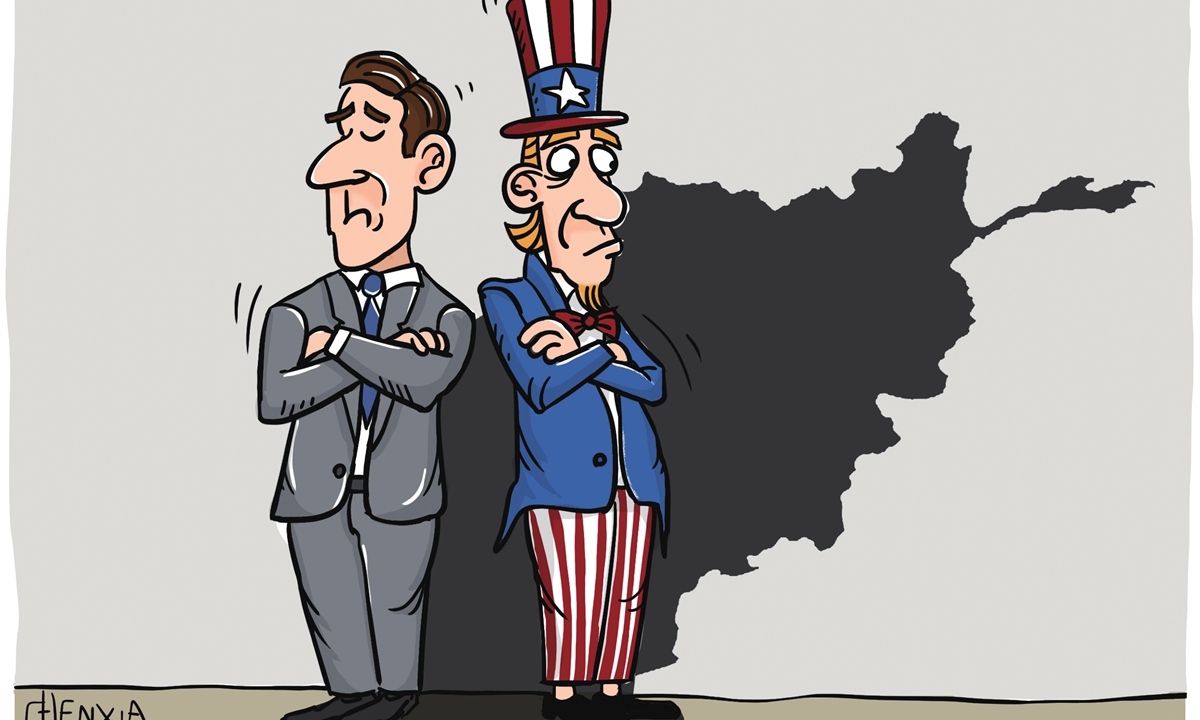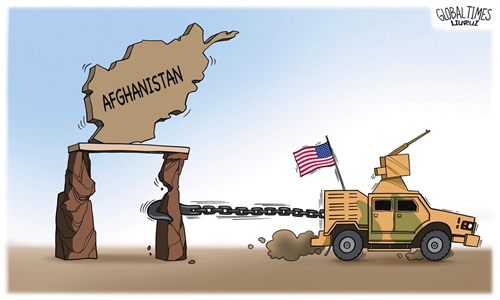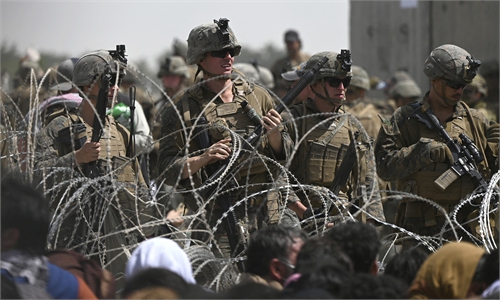
Illustration: Chen Xia/Global Times
The situation in Afghanistan is under the global spotlight. After the Kabul airport blasts killed close to 200 people, many countries have condemned the terrorist attacks. The US and European countries seem to have reached a consensus on denouncing the deadly blasts. Yet divergences among them over the Afghanistan issue are hard to conceal.
After Joe Biden took office, the US and the Europe have ratcheted up coordination. This has, to a large extent, helped fix the transatlantic rift caused by the Trump administration. However, it seems the Afghanistan issue is swallowing up the fragile results. This means the Afghan situation is becoming the new battlefield for major power cooperation and competition. It's also a test to the effectiveness of US-Europe coordination.
First, the US and European countries haven't reached a consensus about troop withdrawal from Afghanistan. When Washington was actively promoting the US troops' pullout from Afghanistan, some European countries harbored different opinions. For instance, the president of the Czech Republic, Milos Zeman, called the decision to pull troops out of Afghanistan "a betrayal," during the NATO Summit in June. In mid-August, Armin Laschet, a German conservative who is aiming to succeed Angela Merkel as chancellor, called the US withdrawal, "the greatest debacle that NATO has experienced since its foundation."
Second, Europe and the US didn't reach a consensus on how to deal with a new Afghan regime. Canadian Prime Minister Justin Trudeau called the Taliban a terrorist organization and pushed for new sanctions. US President Joe Biden said the decision on sanctions against the Taliban will depend on their conduct. Paris also set five conditions for international recognition of the Afghan movement. Berlin held talks with the Taliban about an Afghan-Taliban meeting in Germany, but no decision has been made. Next, in order to better deal with the Afghan issue, the issue still needs to be incorporated into the UN framework and G20 platform for discussion.
Third, there are different voices within the European countries and the US. Taking Germany as an example. German Chancellor Angela Merkel acknowledged that the entire international coalition "clearly underestimated" the speed of such developments. Opposition parties such as the Left Party have criticized the German government's response in Afghanistan, accusing the German government of doing a disgraceful job. With less than a month to go before the German election, Afghanistan could become a risk point that may influence the election results.
The situation in Afghanistan has magnified various voices inside the West. The Afghan issue is not only about regional security, but also about refugees, humanitarian aid, and other topics. The current situation in Afghanistan proves that "the policy adopted by external forces to impose their political models upon others does not work," as Russian President Vladimir Putin said Wednesday.
In general, the EU plays the role of "follower" of the US regarding the Afghan issue. It hasn't developed a role independent of Washington. The different opinions in the West more or less imply differences between Europe and the US. These include the EU's criticism against Biden and its doubt about US' leadership. Therefore, for some European countries, Europe has to strengthen its ability to maintain strategic autonomy both in politics and military matters. However, strategic autonomy is achieved based on the cooperation between the US and NATO. This means that Washington is still involved.
In the next period, the international community will closely follow and assess the situation in Afghanistan, as well as play a constructive role together for a political solution to the Afghan issue. The attitude of the West toward Afghanistan will be based on how the Afghan Taliban implement their policies. It will also rest upon the cooperation and consultation of the global community, especially with major countries like China and Russia. What's more, it needs Afghanistan to adopt an open and inclusive domestic political structure and a moderate and stable foreign policy.
Therefore, the peaceful reconstruction of Afghanistan requires unity and cooperation within Afghanistan and the communication and coordination of the international community. It also needs the Afghan Taliban to cut off connections with terrorist organizations completely, and last but not least - an international environment where all countries can coexist on friendly terms.
The author is a research fellow with the Institute of European Studies, Chinese Academy of Social Sciences. opinion@globaltimes.com.cn


